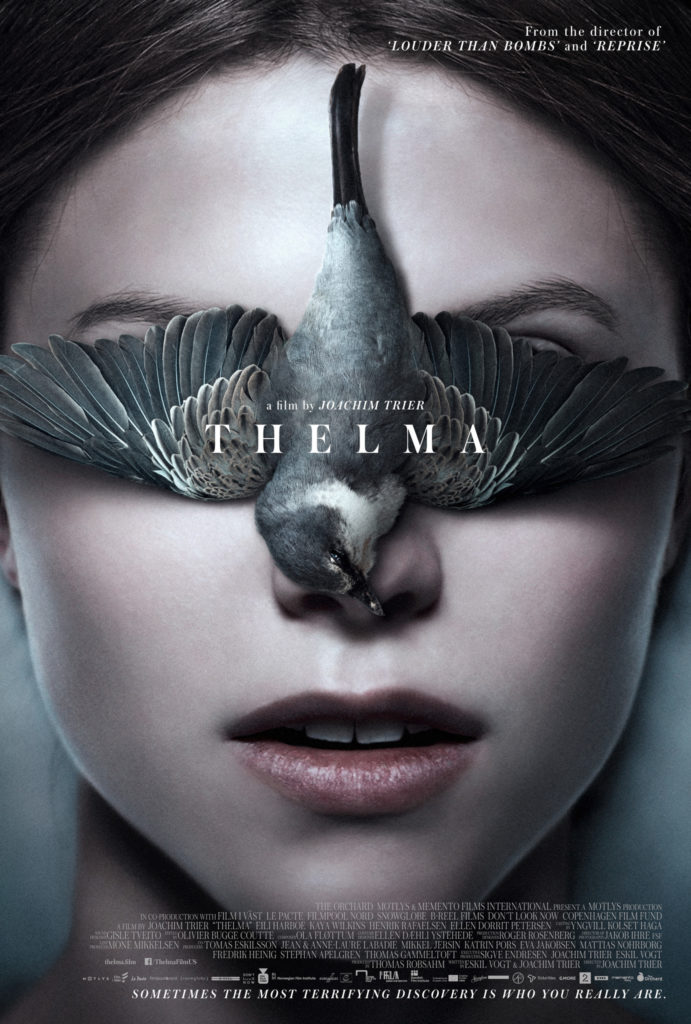Thelma
When critics championed Hereditary earlier this year, I could only think about how so many other horror films have brought insights into familial (dys)function far better – and with greater understanding of how families work – than Ari Aster’s over-rated feature debut. I was tempted to make my Hereditary review a laundry list of comparisons to better, more incisive horror efforts, but refrained.
Joachim Trier’s Thelma remedies the problems I had with Hereditary in seemingly effortless fashion. Perhaps that’s why, despite a “certified fresh” rating over at Rotten Tomatoes, Trier’s film carries a lower profile; it doesn’t hammer down on the horror accelerator, and would probably be more accurately categorized as a dramatic fantasy with horror undertones. And the horror, when it breaks through to the surface, comes from a place that’s vulnerable and always human.
Solid Storytelling
Thelma doesn’t bludgeon the viewer with theme. It’s beautiful and meticulously crafted, and it transforms the act of viewing into something akin to an inexplicable hypnosis. It’s not unintentional that a recurring visual motif is the flicker of harsh white light to bring about stasis.
Unlike Aster’s film, which starts with promise before botching the drama and the horror in the home stretch, Thelma is a genre-fluid work that, for long stretches, fixates on the human condition in a manner that Hereditary uses as a superficial smokescreen (to disappointing non-effect).
All About Thelma
Thelma (Eili Harboe, magnificent) is an undergraduate loner. A virgin raised by religious parents, she finds herself having periodic seizures that coincide with bizarre occurrences within the natural world (a flock of birds converging strangely; the inexplicable rustling of nearby foliage). One day, she becomes smitten with fellow student Anya (Kaya Wilkins), and strikes up a friendship that teeters on the edge of becoming something more. The film captures the awkwardness of human interaction with great accuracy; the social pitfalls of the introverted even more so. There is a palpable longing in Thelma’s pursuit of Anya, and their chemistry – even within a categorically-impaired limbo – is dynamic and fascinating.
The Strengths of the Narrative
Thelma is not dialog-heavy, instead opting for visual metaphors and body language to convey its themes. Imagine a version of Hereditary that is so understanding toward its characters that it has no real need for showboating monologues or shock-value setpieces to make things plain for the audience. Trier, who made familial tragedy resonant in Louder Than Bombs, is just as perceptive and empathetic toward his protagonist here.
Not that Thelma necessarily makes things plain. Or easy. By the time the credits rolled, the drooped-jaw position I’d held since shortly after the film began remained, as I tried to connect the dots of Trier’s intentions. With a tone and pace similar to The Blackcoat’s Daughter and Personal Shopper (two more tales that take a refreshingly human approach to horror, while centering on the loneliness of young female protagonists), the film demands a temperament for the ambiguous and mysterious.
There’s an excellent sequence wherein Thelma agrees to a study to ascertain the source of her seizures, and it casts such a spell because the calm-voiced doctor in the other room keeps encouraging her to plumb her memories; to not flinch from pain or embarrassment. The outcome of this sequence alone – and its desireto explore uncharted emotional terrain, and to just feel– is enough to place Thelma head and shoulders above Hereditary.
The Finish
The religious themes that permeate the tale are indicative of Thelma’s personal crossroads as a human being – intrigued by the temptation of new experiences and possibilities for connection in an urban environment, her inexperience with people and other unknown factors (sex; alcohol; drugs – all the rock-and-roll stuff the church rails against) leaves her retreating to her parents’ isolated homestead, and the rigid grip of their spiritual beliefs. While not as overt in its messaging as Stephen King’s Carrie, it would be remiss to ignore its influence on Thelma.
The fact that Trier doesn’t present the parents as fanatical Bible-thumpers makes their attempts to “do what’s right” resonate with an echo of that classic saying, “the road to Hell is paved with good intentions.” Truth be told, if there’s a specific parallel to any version of Carrie, it’s Kimberly Peirce’s underestimated 2013 film, which was incisive and impactful in its depiction of an exceptional girl’s painful transition to womanhood. Both films share notes of triumph and tragedy that cut so deeply because of the filmmakers’ sincere investment in the characters.
In other words: fuck Paimon.
4.5 out of 5 stars
The Plot Sickens: Check out Jonny Numb’s review of Mandy!
Crash Analysis Support Team
Jonny Numb
 Jonny Numb (aka Jonathan Weidler) never learned how to swim, so he could care less if you close the beaches. He co-hosts THE LAST KNOCK podcast with Billy Crash, and can be found drowning in Twitter and Letterboxd @JonnyNumb.
Jonny Numb (aka Jonathan Weidler) never learned how to swim, so he could care less if you close the beaches. He co-hosts THE LAST KNOCK podcast with Billy Crash, and can be found drowning in Twitter and Letterboxd @JonnyNumb.
Get your Crash Palace and The Last Knock gear!
THE LAST KNOCK horror podcast is a Crash Palace Productions’ featured show. Besides this site, you can find THE LAST KNOCK on iTunes with new shows posted every other Sunday at 9 PM ET.
Crash Palace Productions website design and creation from Brian Yount Digital Enterprises with banner and THE LAST KNOCK art from Palko Designs.
(Thelma movie poster from Motlys Film.)


